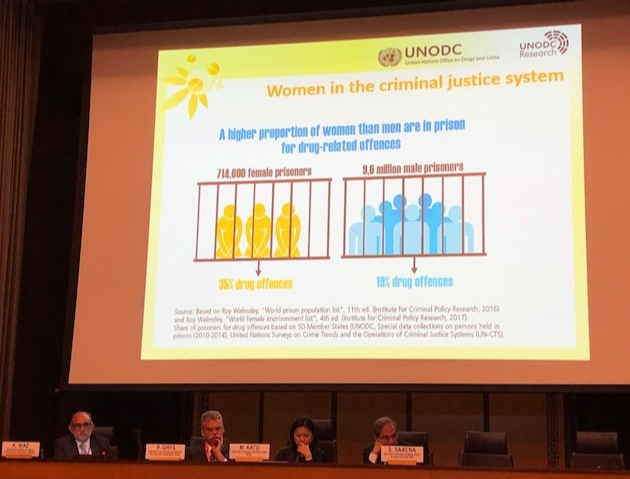The launch of the 2018 World Drug Report took place in Geneva on the 26th of June 2018, on the occasion of the UN International Day against Drug Abuse and Illicit Trafficking. Presenters:
- Kamran Niaz, Epidemiologist in the Drug Research Section, UNODC
- Peter Ghys, Director of the Strategic Information and Evaluation Department, UNAIDS
- Miwa Kato, Director of Division for Operations, UNODC
- Shekhar Saxena, Director of the Department of Mental Health and Substance Abuse, WHO
Ms Kato gave an introduction to the World Drug Report 2018 and pointed out that opium and cocaine production are at an all time high. With regard to the opioid crises she noted that fentanyl gets a lot of attention but tramadol – which is mainly used in developing countries – does not ; she also emphasized the flexibility of the international drug control treaties which she said allows Member States quite a lot of leeway in their decision-making.
Mr. Saxena stressed how health is well-covered in the WDR 2018. He pointed out that drug use accounts for 1.5% of burden of all health-related issues; and called for more resources to cover health needs, as currently these needs are not met.
Mr. Niaz then went through the main findings of the report. There were very few people in the audience so we hope that next year this element can be improved upon. The representative from the Syrian mission to the UN in Geneva posed a question regarding women in the criminal justice system (asking the UNODC to elaborate on the reasons for the increase in numbers of women incarcerated for drug-related offences).
A representative of an NGO in Vietnam asked a question pertaining to people who use drugs, saying that people who use drugs should not be sent to prison; but that unfortunately from the representative’s perspective in many cases, the Vietnamese government seems to change or make up the law as it sees fit and people who use drugs are still sent to prison. The NGO representative also stressed that there is a lot of discrimination against people who use drugs in Vietnam and that this is something that must be addressed. She then asked UNODC and WHO to specify what specific programs the agencies have in Vietnam? Mr Niaz answered saying that UNODC has a project in Vietnam to help the government set up treatment facilities that are outside the custodial facilities; and that it will take time, years, to change the situation. He emphasised that it is a joint program between UNODC and WHO with the aim of providing evidence-based effective drug services. The representative from the Vietnamese NGO then asked what UNODC can do to change the predominant perspective of the government has of people who use drugs, saying that right now it is a very discriminatory approach. M. Saxena from WHO answered saying that he is not able to answer with regard to the specific situation in Vietnam, but that the WHO Office in Vietnam can surely provide answers to the question. However, Mr. Saxena emphasised WHO’s very clear guidance to member States that people who use drugs must be able to access health care services.
A representative of the Geneva Platform on Human Rights, Health and Psychoactive Substances made an intervention, giving the same Civil Society Task Force on Drugs (CSTF) statement that was read in New York and Nairobi; and stressing the importance of having meaningful civil society participation at all relevant proceedings leading up to and including at the 2019 Ministerial Segment. The statement was well received with Ms Kato from UNODC saying that the Office fully agrees with what was said in the statement and that they look forward to cooperating and working together with civil society in the coming year.
